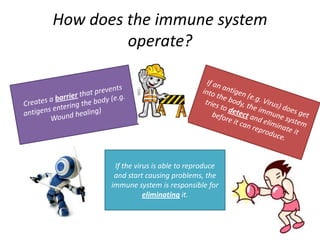Stress and the immune system
- 1. Stress and the Immune System
- 2. Immune System the body’s main way of defending itself against millions of antigens that would otherwise invade it. None of these things will be able to affect the body when the immune system is working effectively. The moment that the immune system stops functioning properly, the body becomes at risk of infection.
- 3. How does the immune system operate? If the virus is able to reproduce and start causing problems, the immune system is responsible for eliminating it.
- 4. Impact of stress on the immune system Stress may have a general impact on the immune system, Acute stressors can lead e.g. Immunosupression to an upregulation Alternatively it may affect (increased strength) of natural or specific immunity or natural immunity even alter the balance between cellular and humoral immunity Chronic stressors can lead to downregulation Sergerstrom & Miller (2004) of the immune system conducted meta-analysis and concluded that stress can strengthen natural immunity
- 5. Stress and the Immune System A - Kiecolt-Glaser et al (1995) wanted to investigate the direct effects of stress on the immune system – specifically looking at how quickly wounds heal P - Field experiment/volunteer sample •13 female participants •Carers for relatives with senile dementia •Matched participant design with 13 women matched on age, income etc… •Puncture biopsy (3.5mm below elbow) NE •Cytokine level assessed •Stress perception questionnaire
- 6. Stress and the Immune System F - Kiecolt-Glaser found that wound healing took significantly longer in the carers than the control group Cytokine levels were lower in the carers too, their perceived stress scale was higher also! C - The findings support the idea that chronic stress depresses immune functioning – leading to increased vulnerability to infection!
- 7. Evaluation – your turn! Strengths Weaknesses •Supported by •Correlational Marucha et al study (1998) •Low population validity •High ecological •Volunteer Sample validity
- 8. Field experiment • Kiecolt-Glaser’s research was a field experiment • For example, the research was conducted in a real life setting and gathered natural behaviour • This is positive as the research investigated real life stress and the findings can be generalised beyond the research setting
- 9. Marucha • Kiecolt-Glaser’s research is supported by Marucha • For example, Marucha found that wounds heal 40% quicker in students during their summer holidays compared to 3 days before an exam • This is positive as it support the idea that stress suppressed the immune system and therefore slows recovery from illness.
- 10. Female participants • Kiecolt-Glaser’s sample was gynocentric • For example, the research only tested the female stress response • This is a weakness as the findings are not applicable to men as men might respond differently to stress
- 11. Volunteer sampling • Kiecolt-Glaser collecting their participants using volunteer sampling • For example, this means that the research will have been populated with similar people (type A personalities are more likely to volunteer) • This is a weakness as the findings lack population validity and are not able to be generalised beyond the setting to the wider population (as non-type A’s may not respond to stress in the same way as type A’s)










